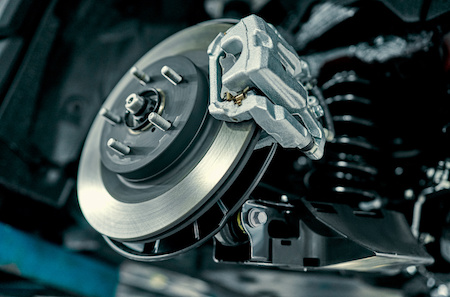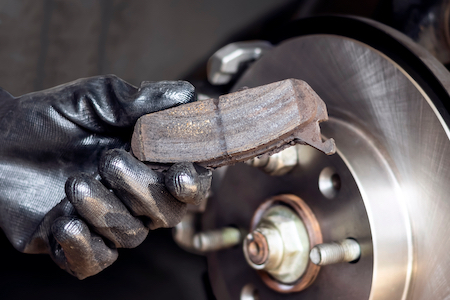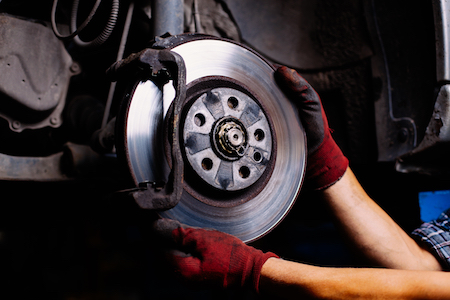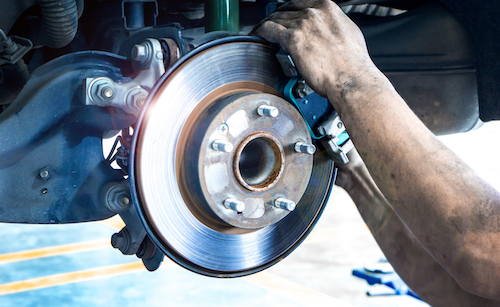Accidents are never planned. Instead, you’re out and about, accomplishing your daily task list when – wham – you’re now part of a statistic.
The thing about accidents is most are preventable. Most are driver errors. Statistics show that over 50 percent of all accidents in the US are caused by aggressive drivers. Rear-end collisions are the most common, with tailgating contributing to more than one-third of all crashes.
Slowing down and becoming an offensive driver can increase your odds of living accident-free. The other is regular maintenance – well-performing brakes ensure your safety.
Brakes are one of the most essential safety systems on your vehicle. Well-functioning brakes ensure your safety no matter where your drive takes you. It’s also a skill. Do you understand how to brake safely?
Understanding how a car’s brake system should work
The brakes play a fundamental role in bringing your vehicle to a halt, and a well-functioning brake system is essential for your safety and the safety of others on the road. Let’s break down the basics of how a car’s brake system should work in simple terms.
The Brake Components
At its core, a car’s brake system consists of several key components. The main players are the brake pedal, brake fluid, brake pads, and brake rotors (also known as brake discs). These components work together seamlessly to slow down and stop your vehicle when needed.
Initiating the Stop
When you press the brake pedal with your foot, you’re initiating a series of actions that lead to your car slowing down or coming to a stop. This action triggers a hydraulic system that sends brake fluid to the brake calipers.
Hydraulic Power
Brake fluid is a hydraulic fluid that transfers the force from your foot on the brake pedal to the brake calipers near each wheel. This hydraulic force ultimately squeezes the brake pads against the brake rotors.
Friction and Slowing Down
The brake pads, positioned on either side of the brake rotor, are designed to create friction when pressed against the rotating rotor. This friction slows down the wheel and, consequently, the entire vehicle. It’s like a controlled version of rubbing your palms together to create heat.
Smooth and Safe Stop
The key to a smooth and safe stop lies in the balance of these components. The brake system should respond predictably and consistently, allowing you to slow down or stop without surprises. If everything is working as it should, you’ll experience a controlled deceleration, bringing your car to a halt without jerks or unexpected jolts.
What happens when your brake system is no longer working optimally
Brakes come with a suggested lifespan, but it’s only suggested. Every system wears down at its own pace, depending on your unique situation.
- How much you drive
- Where you park your car
- Climate
- Weather conditions
- Driving conditions
- Maintenance routines
All of it matters.
Even the most reliable brake systems can experience wear and tear over time. The key is recognizing the signs of a brake system no longer working optimally. Let’s explore common indicators that it’s time to give your brakes some attention:
Screeching or Squealing Noises
One of the earliest warning signs of brake trouble is often an audible one. If you start to hear a high-pitched screech or squeal when applying the brakes, it could be an indication that the brake pads are wearing thin. The noise is typically produced by a small metal shim called an indicator, designed to alert you when the pads are nearing the end of their lifespan.
Grinding Sensation
A grinding sensation when braking is a red flag. This could mean the brake pads have worn down completely, and the metal backing is now grinding against the brake rotor. Driving with this issue can cause significant damage to the rotors, leading to more extensive and costly repairs.
Soft or Spongy Brake Pedal
A healthy brake pedal should feel firm and responsive. If you notice a soft or spongy sensation when you press the brake pedal, it may indicate air or moisture in the brake fluid, a potential leak, or a problem with the master cylinder. In any case, it’s essential to address this issue promptly for optimal braking performance.
Vibrations or Pulsations
If you feel vibrations or pulsations through the brake pedal or steering wheel when braking, it could be a sign of warped brake rotors. Warping can occur due to overheating during prolonged or aggressive braking. This issue not only affects the effectiveness of your brakes but also compromises the smoothness of your stops.
Uneven Braking
Pay attention to uneven braking, where your car pulls to one side when you apply the brakes. This may suggest uneven wear on the brake pads or issues with the brake calipers. Properly functioning brakes should provide consistent stopping power without any noticeable deviation.
Dashboard Warning Lights
Modern vehicles are equipped with electronic systems that monitor various aspects, including the brake system. If you see a warning light on your dashboard that resembles a circle with an exclamation mark or the word “BRAKE,” it’s a signal from your car’s computer that there may be an issue with the brake system. Ignoring such warnings can lead to more severe problems over time.
Burning Smell
If you detect a burning smell, especially after heavy or prolonged braking, it could indicate overheating brakes. Overheating can compromise the efficiency of the brake system and may result in brake fade, where the brakes become less responsive.
Recognizing these signs promptly and addressing them with professional inspection and maintenance can prevent further damage and ensure the continued effectiveness of your brake system.
Proactive measures you can take to maintain your brake system and promote longevity
While recognizing warning signs can help you get your vehicle in for maintenance before you face road hazards, there are other things you can do to maintain a healthy brake system. Here are some proactive measures you can take to ensure the longevity and optimal performance of your car’s brake system:
Regular Inspections
Schedule regular brake inspections, ideally during routine maintenance visits or whenever you notice any unusual signs. Professional inspections can identify potential issues before they escalate into more significant problems.
Check Brake Fluid Levels
Brake fluid plays a crucial role in the hydraulic system that enables your brakes to function. Periodically check the brake fluid levels and top up if necessary. Consult your vehicle’s manual for the recommended type of brake fluid and follow any guidelines for proper fluid maintenance.
Replace Brake Fluid
Over time, brake fluid can absorb moisture, compromising its effectiveness. Consider replacing the brake fluid as recommended by your vehicle’s manufacturer. This helps maintain the hydraulic integrity of the system, preventing issues like a soft or spongy brake pedal.
Monitor Brake Pad Thickness
Keep an eye on the thickness of your brake pads. Most brake pads have wear indicators that become visible as the pads wear down. If the pads are nearing the end of their lifespan, have them replaced promptly to avoid damage to other brake components.
Address Brake Fluid Leaks
Any signs of brake fluid leaks should be addressed immediately. Brake fluid leaks not only compromise braking performance but can also lead to more extensive and costly repairs. If you notice a puddle or stains beneath your car near the wheels, have a professional inspect and repair the issue.
Avoid Aggressive Driving
Prolonged or aggressive braking generates excessive heat, which can accelerate wear on brake components. Try to drive in a manner that minimizes the need for sudden, heavy braking. This helps preserve your brake system and contributes to better fuel efficiency.
Rotate Tires Regularly
Uneven tire wear can impact the effectiveness of your brakes. Regularly rotating your tires helps ensure even wear on both the tires and brake pads. This simple maintenance task contributes to a more balanced and reliable braking system.
Follow Manufacturer Recommendations
Adhere to the maintenance schedule and recommendations outlined in your vehicle’s manual. Manufacturers provide guidelines for brake system maintenance based on the specific make and model of your car. Following these recommendations can extend the life of your brake components.
Brake System Flush
Consider periodic brake system flushes, especially if recommended by your vehicle’s manufacturer. A brake system flush involves replacing old brake fluid with fresh fluid, helping remove any contaminants that may have accumulated over time.
DIY Checks
In addition to professional inspections, perform basic DIY checks, such as visually inspecting brake components for signs of wear, and listening for any unusual sounds when braking. Early detection of issues allows for timely intervention.
Remember, a well-maintained brake system not only ensures your safety but also promotes a smoother driving experience. Keeping your vehicle in good working condition creates a safer environment for you, your passengers, and other vehicles around you.
It doesn’t take a lot of time or energy for brake mastery. Once you understand a little more about how the brake system works, you’ll be an expert at ensuring your car is well-maintained and safe for every drive you make.
How can we help you maintain a safer vehicle for your drive?




